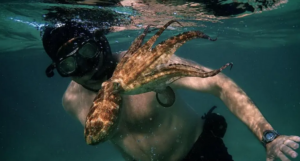In 2010, a renowned nature filmmaker called Craig Foster – suffering from debilitating burnout and adrenal fatigue at the time – eventually made friends with a speckled, eggplant-hued octopus while freediving to get out of his lethargy. At first, the octopus was unwilling to move about freely in Foster’s presence, but over time Foster proved himself not to be a threat. The slow acclimation process culminated in a touching meeting where the octopus inches toward Foster and hesitantly unfolds one of her arms onto his hand, playfully latching on with her suckers and leaving Foster astonished. The whole process was documented by Netflix, and you can watch where it all evolved here.
Although octopi are known to be wickedly smart, the mollusks are hardly well-understood. And lobsters, and squid, are no exception. But now we have recognized they have feelings, like we do.
Well, at least in the UK. The government there has now officially included decapod crustaceans – including lobsters, crabs, and crayfish – and cephalopod mollusks – including squid, octopuses, and cuttlefish – in its Animal Welfare (Sentience) Bill, IFL Science reports. This means they are now recognized as “sentient beings” in the United Kingdom.
Which countries still have slavery in the world today? (infographic)
The measure originates from an independent review led by Dr Jonathan Birch, an associate professor at the London School of Economic’s Department of Philosophy, Logic, and Scientific Method. The research team there reviewed over 300 studies and found “strong scientific evidence decapod crustaceans and cephalopod mollusks are sentient” – meaning they can consciously perceive feelings and sensations like pain.
Vertebrates (animals with a backbone) are already covered by the bill, but octopuses and other invertebrate animals were previously left out due to their lack of a backbone. And although the central nervous system of invertebrates is indeed very different from that of vertebrates, that doesn’t necessarily mean their central nervous system is any less complicated than certain mammals considered sentient by humans. Octopuses, for example, have a donut-shaped brain in their head and eight other “mini-brains” in each tentacle. And they can be incredibly intelligent, as demonstrated by the documentary My Octopus Teacher described in the intro to this article. They are capable of some remarkably complex behavior, including interpreting potentially physical and emotional pain.
Read more: Earthly Mission
Ask me anything
Explore related questions





